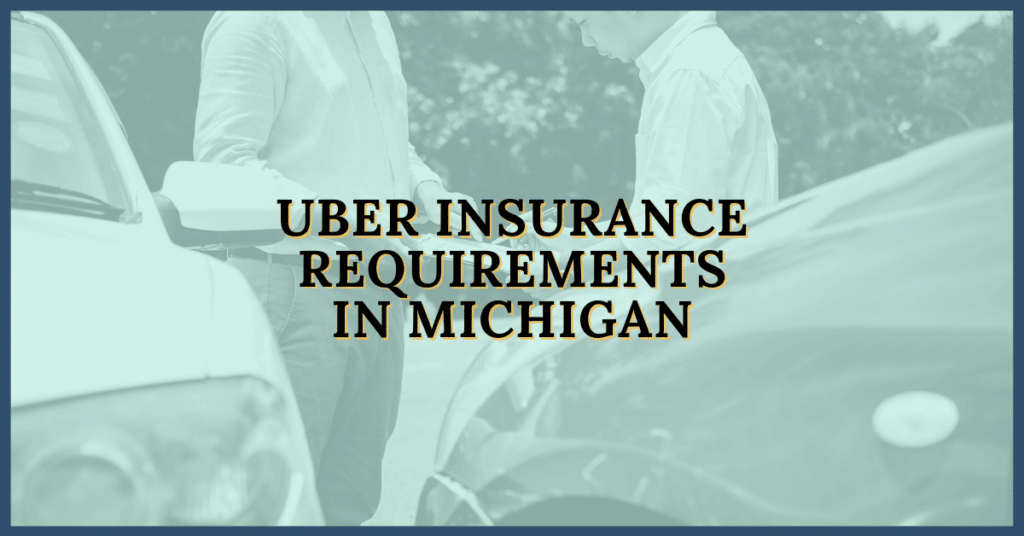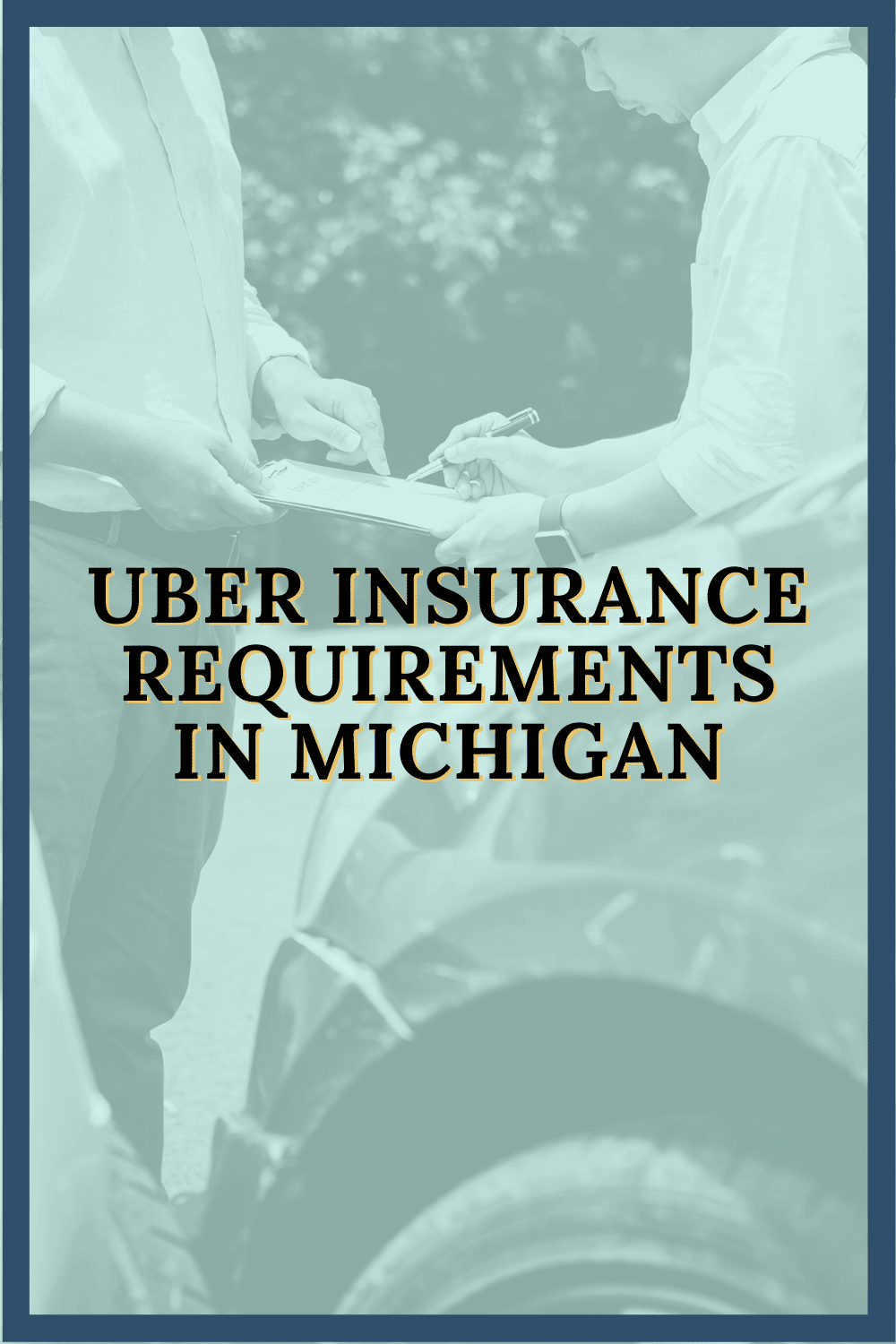Uber Insurance Requirements for Michigan

As more and more Uber vehicles crowd our roads and get involved in car accidents, it is important to know the Uber insurance requirements for Michigan whether you are an Uber driver, a frequent Uber passenger, someone who may share the road with an Uber or may encounter Ubers as you are walking or bicycling.
Uber insurance requirements when an Uber driver is on-duty
The requirements provide that an Uber driver who is on-duty and “is available to” transport Uber passengers (but “is not engaged” in doing so presently) must have the following coverages in effect:
- Liability coverage “in the amount of at least $50,000.00 per person for death or bodily injury” and “$100,000.00 per incident for death or bodily injury . . .” (MCL 257.2123(2)(a); 257.518b(1)(a)(i))
- Property damage coverage in the amount of $25,000. (MCL 257.2123(2)(a); 257.518b(1)(a)(i))
- Coverage for No-Fault PIP benefits (also known as “personal protection insurance” benefits) (MCL 257.2123(2)(b); 257.518b(1)(a)(ii))
- Coverage for No-Fault property protection insurance benefits. (MCL 257.2123(2)(b); 257.518b(1)(a)(ii))
The amount of No-Fault PIP benefits coverage that will be available in the event of an Uber accident will depend on the No-Fault PIP medical benefits coverage level selected in the Uber driver’s auto insurance policy. (MCL 500.3107c(5))
Uber insurance requirements when an Uber driver is transporting passengers?
The Uber insurance requirements provide that an Uber driver who “is engaged” in transporting an Uber passenger or passengers must have the following coverages in effect:
- Liability coverage “with a minimum combined single limit of $1,000,000.00 for all bodily injury or property damage.” (MCL 257.2123(3)(a); 257.518b(1)(b)(i))
- Coverage for No-Fault PIP benefits (also known as “personal protection insurance” benefits) (MCL 257.2123(3)(b); 257.518b(1)(b)(ii))
- Coverage for No-Fault property protection insurance benefits. (MCL 257.2123(3)(b); 257.518b(1)(b)(ii))
The amount of No-Fault PIP benefits coverage that will be available in the event of an Uber accident will depend on the No-Fault PIP medical benefits coverage level selected in the Uber driver’s auto insurance policy. (MCL 500.3107c(5))
Who maintains the coverage to satisfy the requirements in Michigan?
The Uber insurance requirements that apply to Uber drivers when they are on-duty and/or transporting passengers “may be satisfied by automobile insurance maintained by” the Uber driver, Uber itself, “or a combination of both.” (MCL 257.2123(4))
How do the requirements apply to a lapse in coverage?
If it turns out the auto insurance on an Uber’s driver car either lapses or does not provide the legally-mandated coverage, then the insurance maintained by Uber “shall provide the coverage required . . . beginning with the first $1.00 of a claim” and Uber’s “insurer shall defend the claim.” (MCL 257.2123(5))
Proof that the requirements are met
Both Uber and Uber drivers are responsible for providing proof that the Uber insurance requirements are met:
- In order to do business in Michigan as a “transportation network company,” Uber must provide proof to the Department of Licensing and Regulatory Affairs (LARA) that Uber has complied with the requirements. (MCL 257.2104(5)(a))
- Uber is prohibited from allowing an Uber driver to transport passengers if the Uber driver “does not possess proof of automobile liability insurance for each personal vehicle that he or she intends to use to provide transportation network company prearranged rides.” (MCL 257.2107(2)(f))
- An Uber driver “shall carry proof” that he or she is in compliance with the Uber insurance requirements “at all times during his or her use of a personal vehicle in connection with” being an Uber driver. (MCL 257.2123(8))
- If an Uber driver is involved in an accident, then he or she shall provide “upon request to directly interested parties, automobile insurers, and investigating law enforcement officers” proof of insurance in compliance with the Uber insurance requirements and whether he or she was on-duty as an Uber driver or transporting Uber passengers at the time of the accident. (MCL 257.2123(8))
Uber insurance policy is primary
An Uber driver or Uber on the driver’s behalf “shall maintain primary automobile insurance on a personal vehicle” used to drive for Uber that “recognizes” that the Uber driver “uses the vehicle” as an Uber driver “and covers” the Uber driver “while he or she” is on-duty for Uber or “while he or she is engaged in” transporting an Uber passenger. (MCL 257.2123(1))
What are the Uber insurance requirements when Uber is the “named insured” on the policy?
Auto insurance coverage provided by a policy maintained by Uber “shall not be dependent upon [the Uber driver’s] personal automobile insurer denying the claim first and shall not require [the Uber driver’s] personal automobile insurer to deny the claim first.” (MCL 257.2123(6))
Also, if Uber is the “named insured” on a policy, then the only available coverage levels for No-Fault PIP medical benefits are $250,000, $500,000 and unlimited. (MCL 500.3107c(7))
Need help after an Uber accident? Call the attorneys at Michigan Auto Law
Call toll free anytime 24/7 at (800) 968-1001 for a free consultation with one of our experienced attorneys if you were injured in an Uber accident. Michigan Auto Law attorneys have spoken at national seminars and legal conferences, teaching injury lawyers across the country how to better handle Uber car accident cases and better protect our clients. You can also get help from an experienced accident attorney by visiting our contact page or you can use the chat feature on our website.






